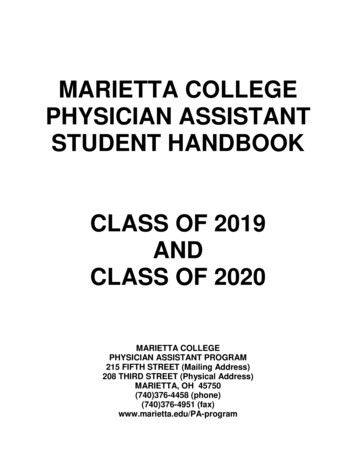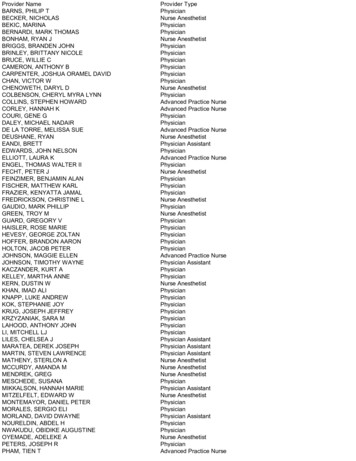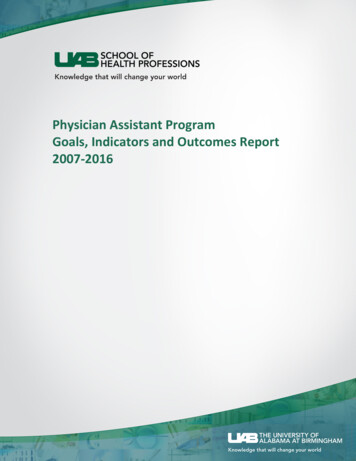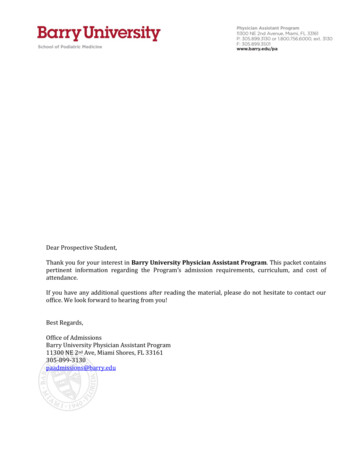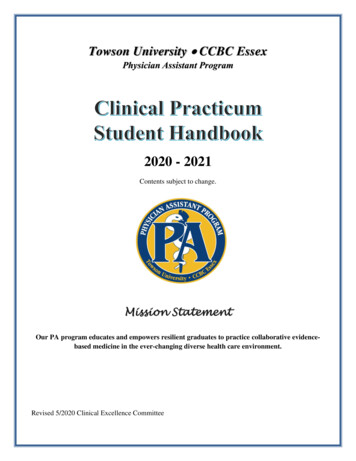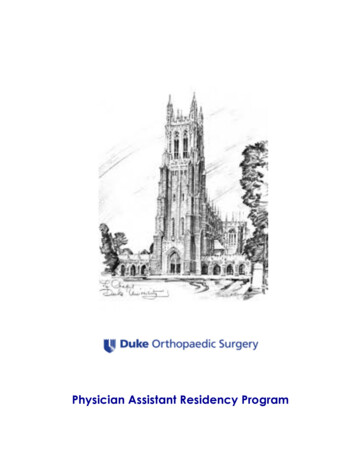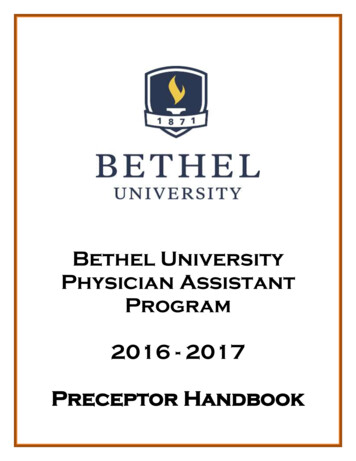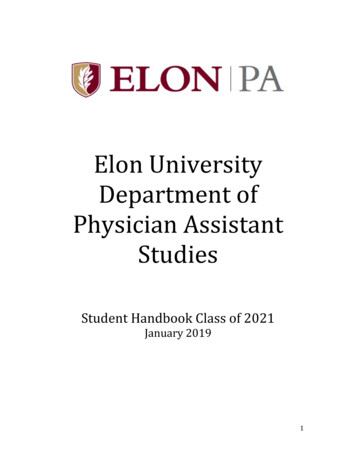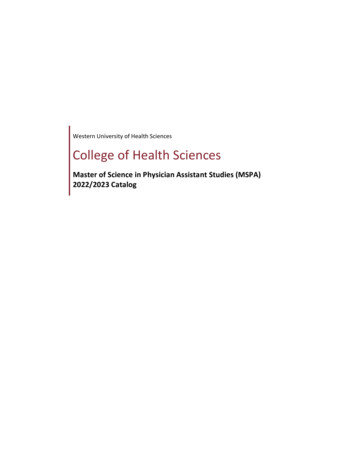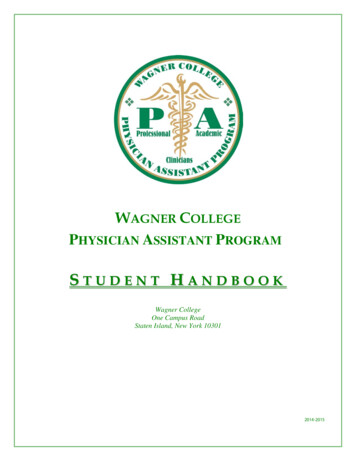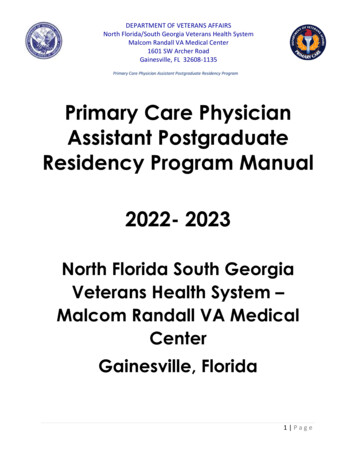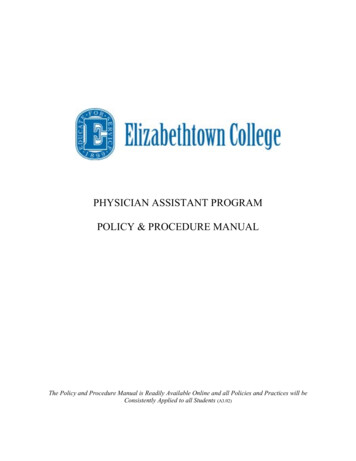
Transcription
PHYSICIAN ASSISTANT PROGRAMPOLICY & PROCEDURE MANUALThe Policy and Procedure Manual is Readily Available Online and all Policies and Practices will beConsistently Applied to all Students (A3.02)
Elizabethtown College Physician Assistant ProgramPolicy ManualTable of ContentsIntroduction .1Program Committees .1Academic Integrity and Honesty Policy .2Attendance Policy: Didactic Year .4Attendance Policy: Clinical Year.6Background Screenings Policy .10Blood Borne Pathogen Exposure Policy .11Chemical Hazard Exposure Policy .12Classroom Conduct Policy .14Clinical Site Assignment Policy .15Communicable Disease Exposure Policy .17Deceleration Policy .18Discrimination, Harassment, and Bullying Policy .19Dress Code Policy .21Drug and Alcohol Screening Policy.23Employment during Professional Program .25Extracurricular Activities during Professional Program .26Family Educational Rights and Policy Act .27Grade Policy.28Grievance and Appeal Policy.29Health Insurance Policy .31Health Insurance Portability and Accountability Act (HIPAA) Policy .31Inclement Weather Policy .32Infection Control & Prevention Policy .34Professionalism Policy .36Program Dismissal Policy .38Reference Release Policy .40Remediation Policies: Academic Remediation Policy.40Remediation Policies: Professionalism Remediation Policy .43Satisfactory Academic Progress Policy .47Social Media Policy .48Student Health Policy .50Student Referral for Services Policy .52Tuition and Fee Refund Policy .53Withdrawal Policy .54The content published in this handbook applies to ALL students regardless of location. Signed clinicalaffiliation agreements may specify that certain program policies will be superseded by those at theclinical site. Program policies and practices are defined, published, and will be readily available tostudents. Similarly, proceedings associated with the material included in this handbook will consistentlybe followed by ALL principal faculty and the program director, regardless of location. (A3.01, A3.02)i
Elizabethtown College Physician Assistant Program Policy & Procedure Manual (A3.01)IntroductionThe Physician Assistant Program is committed to the fair and equitable treatment of its students inaccordance with established policies. This policy manual is designed to be the primary referencedocument for communicating and interpreting program specific policies, programs, and procedures toElizabethtown College Physician Assistant Program students. The policies contained in this manual areessential to maintaining the mission and goals of the Program that align with the values and goals of theCollege.The Physician Assistant Program faculty and staff will process essential changes in program policiesthrough the Physician Assistant Faculty Committee. The Program reserves the right to interpret, alter,reduce, or eliminate any practice or policy, in whole or in part, where changes in the law or othercircumstances render necessary changes in policy, As policy changes are made, the appropriate pages inthe manual will be updated and a detailed record of policy modifications will be kept and maintained bythe program administrative assistant over a 10 year period.Program related policies apply to all students, principal faculty and the program director regardless oflocation. (A3.01).Program Committees.The Physician Assistant Program is a under the leadership of the Program Director, who supervises theMedical Director, principal/instructional faculty and staff (A2.10). The Program Director reports directlyto the Dean of the School of Human and Health Professions.The Physician Assistant Program’s governance and self-assessment is conducted by the followingcommittees (A2.05):Physician Assistant Faculty Committee (PAFC) includes all faculty members from the didactic andclinical curriculum phases of the program, medical director, and the Program Director. The PAFC ischarged with the responsibility to participate in the following aspects of the Physician Assistant Program: Development, review, and revision as needed of the program mission and vision statement.Development, review, and revision as needed of the program goals, competencies, andcurriculum.Development, review, and revision as needed of the program self-assessment process.Development, review, and revision as needed of the program admission and enrollment criteria.Development, review, and revision as needed of the graduate competencies.Review and provide recommendations for institutional support, resources, and services to provideevidence of student learning and administrative functions and outcomes of the program.Selection of applicants for admission to the PA program.Participation in the instruction, evaluation, and assessment of didactic and clinical courses.Participation in the academic counseling of students.Participation in ongoing evaluation of the program.The Academic and Professional Affairs Committee (APAC) is charged with the responsibility to overseethe academic and professional progress of all students enrolled in the Physician Assistant Program atElizabethtown College. In addition to overseeing academic and professional progress, APAC willenforce requirements, establish remediation, and recommend probation or dismissal from the PhysicianAssistant program of study to students whose performance falls below a specified level.The APAC committee may review and discuss all student educational records with appropriate facultymembers and/or preceptors in determining an appropriate course of action for students under review.1
Academic Integrity and Honesty Policy (B2.19a, b, c)Policy Rationale:Honesty must be the basis of good academic work, and promoting academic honesty requires anunderstanding of the definition of academic dishonesty as well as its different types and causes.Elizabethtown College faculty and administration will take all forms of academic dishonesty as a seriousoffense.Associated Definitions:Academic Dishonesty: Academic dishonesty refers to committing or contributing to acts ofdishonesty in teaching, learning, research, and other academic activities.Cheating: the unauthorized use of information, materials, devices, sources, and practicesto complete academic activities.Examples include but are not limited to: copying another individual’s answers on an assignmentusing unauthorized sources for completion of an assignmentengaging in behaviors prohibited in course syllabi or policiesPlagiarism: the adoption of another individual’s ideas, designs, art, etc. as his/her ownwithout acknowledging the source or obtaining permission from the author.Examples include but are not limited to: copying material from another source without proper citationunacknowledged use of materials prepared by another individualFabrication or Falsification: the unauthorized alteration or creation of informationrequired for an academic activity or document.Examples include but are not limited to: artificial creation of dataalteration or artificial creation of patient logging exposures or procedurecompletionSabotage: the disruption or destruction of another individual’s work which may preventthem from completing the activity successfully.Examples include but are not limited to: failure to contribute effectively as a team member for a projectdestroying another person’s artwork, experiment, or designAssociated Forms: NonePolicy Statement: Students are expected to review and follow the Elizabethtown College “Standards ofAcademic Integrity” as published in the Elizabethtown College Catalog.Academic Judicial System and Student Academic Integrity Handbook.2
Procedure for Dealing with Cases of Academic Dishonesty:1. Initial Conferencea. When an instructor discovers evidence of academic dishonesty, an informal conference isscheduled promptly with the student or students involved. If a face-to-face meeting is notpossible, this conference can take place via e-mail. If an instructor is unable to schedule aconference before grades are due, a grade of Incomplete for the course may be assignedin the interim. If the student confirms his or her academic dishonesty in the initialconference, then the procedure continues with the written notification step that follows.2. Second Conferencea. If, in the informal conference, the student denies academic dishonesty but the instructoris satisfied that there is evidence of academic dishonesty, a second conference isscheduled with the student involved. In cases involving more than one student, eitherindividual or group conferences may be appropriate depending on the particularcircumstances of the case. This conference should be conducted with the Student,Instructor, and Academic and Professional Affairs Committee (APAC). The student alsohas the right to have a faculty member, another student, or a member of the Center forStudent Success present as an observer. Due to the nature of this second conference, itshould be scheduled as a face-to-face meeting.3. Written Notificationa. If, following either the first or second conference, the initiating faculty member andmembers of APAC are satisfied that there is proof of academic dishonesty, the APACcommittee will give the accused student(s) written notification specifying the infractionand the recommended penalty. Copies of this notification are sent to the ProgramDirector and the Dean for Curriculum and Assessment. Should the Program Director notbe in agreement with the faculty member, both the faculty member and the DepartmentChair (or equivalent) will give written notification with rationale to the Dean forCurriculum and Assessment. The Dean for Curriculum and Assessment will review thematter, recommended actions, and will inform the student in writing of their decision.4. Reported Casesa. Cases of alleged academic dishonesty reported by a student or students or College staffand not resolved by the instructor, APAC committee, and Program Director may also bereferred to the Dean for Curriculum and Assessment. The Dean for Curriculum andAssessment will review the matter and recommend action and will inform the student(s)in writing of the recommended action.5. Academic Review Committeea. The accused student(s) will have the alternative of (1) accepting the penaltyrecommended by the faculty member or the Dean for Curriculum and Assessment [in thecase of a difference between the faculty member and the Program Director or (2)requesting a hearing before the Academic Review Committee. The request for a hearingmust be presented in writing to the Dean for Curriculum and Assessment within fivebusiness days of receipt of the notice of information. In no case may the AcademicReview Committee impose a penalty more severe than the one imposed by the facultymember, or the Dean for Curriculum and Assessment, as the case may be.6. Dismissala. Beyond the penalty imposed for the individual course, the Dean for Curriculum andAssessment will review each case of academic dishonesty and exercise judgment as towhether a student found to be in violation of the standards of academic integrity shouldbe recommended for dismissal from the College. If it is the Dean for Curriculum andAssessment’s judgment that academic dismissal is appropriate, the Dean of Curriculumand Assessment will notify in writing both the student and the Academic StandingCommittee of his or her decision and the factors that influenced that decision.3
7. Academic Standing Committeea. In the event of dismissal, the student will have the option of (1) accepting the Deanfor Curriculum and Assessment’s decision, or (2) requesting a hearing before theAcademic Standing Committee. The request for a hearing must be presented in writing tothe Dean for Curriculum and Assessment within five business days of receipt for theDean of Curriculum and Assessment’s decision. The Academic Standing Committee’sdecision is final.Policy Accessibility: The Academic Honesty Policy for the PA Program can be located in the PAprogram policy and procedure manual, and course syllabi.In compliance with ARC-PA Standard B2.19 (a, b,c), instruction on Intellectual Honesty and AcademicIntegrity will occur in the following courses:MPA 551 Patient Communication and Education 1MPA 552 Patient Communication and Education 2Approved: 1/31/21Revised:Policy Review Frequency: AnnuallyApproving Body: PAFCApproving Body:Next review: 1/2022ReferencesElizabethtown College Student Handbook. Policies and Procedures Regarding Brief Absences, Leave ofAbsence and Withdrawals and other Academic Issues. Retrieved fromhttps://catalog.etown.edu/content.php?catoid 13&navoid 637Whitley, B.E., & Keith-Spiegel, P. (2002). Academic Dishonesty: An Educator’s Guide. Mahwah, NJ:Lawrence Erlbaum Associates, Publishers.Applicable ARC-PA StandardsB2.19. The curriculum must include instruction in:a) intellectual honesty,b) academic integrity, andc) professional conductAttendance Policy-Didactic Year (B2.19c)Policy Rationale:Regular attendance is of the utmost importance for students enrolled in the Physician Assistant programfor enhancement of both professional and personal growth, as well as measuring of academicachievement and proficient completion of clinical skills.Associated Definitions:Bereavement: Bereavement leave encompasses any absence due to a death in the family.Excused Absence: Absence from program required event such as class, lab, training, or clinicalrotation that is discussed with and approved by the course instructor prior to the event.4
Unexcused Absence: Absence from program required event such as class, lab, training, orclinical rotation that is not discussed with the course instructor prior to the event, or that is notapproved by the course instructor.Tardiness: Students are expected to be present at all program required events such as class, lab,training, and clinical rotations by the official start time and stay until it ends,Associated Forms: NonePolicy Statement: Attendance at all classroom, laboratory, and other program related activities ismandatory. The PA program will attempt to hold all program related material during regular hours;however due to unforeseen circumstances, the PA program reserves the right to schedule activities outsideof regular hours, including evenings and weekends.The faculty and staff of the PA program understand that life can present unavoidable and unplannedemergencies. In order to maintain the integrity of the program, any and all unplanned absences should bereported to the PA program as soon as possible. Failure to notify the program in a timely manner willresult in receiving an unexcused absence. More than two unexcused absences within each semester mayresult in disciplinary action including, but not limited to, a professionalism remediation plan, review bythe Academic Standing Committee, course failure, or dismissal from the program.Procedure for Dealing with Cases of Tardiness and Absence:1. Written Communication:a. Course appropriate and/or advisor program faculty will communicate in writing withstudents following each tardy and/or unexcused absence that occurs. Reference toprogram attendance policy requirements will be made.2. Conference:a. Students must meet with the course appropriate and/or advisor program faculty either inperson or via Zoom following the second unexcused absence. At this time a writtennotification will be given to students and review of the attendance policy requirementswill be held.3. Conference:a. Students must meet with the course appropriate and/or advisor program faculty in personfollowing a third unexcused absence. At this time a written notification of course failurewill be given to students and review of the attendance policy requirements will be held.4. Academic and Professional Affairs Committee:a. Students will meet with the course appropriate and/or advisor program faculty andmembers of the APAC committee to discuss attendance related concerns in excess ofthree unexcused absences. As published, three of more unexcused absences will result inprofessionalism dismissal from the Physician Assistant Program pending the discovery ofextenuating circumstances. The APAC committee will give the student writtennotification of their decision. Copies of this notification are sent to the Program Directorand the Dean for Curriculum and Assessment.Should the Program Director not be in agreement with the decision of the APAC committee, writtennotification with rationale will be submitted to the Dean for Curriculum and Assessment. The Dean forCurriculum and Assessment will review the matter, recommended actions, and will inform the student inwriting of their decision.Policy Accessibility: The Attendance Policy for the PA Program can be located in the PA program policyand procedure manual, student manuals, and course syllabi.In compliance with ARC-PA Standard B2.19 (c), attendance policies are available to all students in thePA policy and procedure manual as well as on course syllabi and student manuals.5
Approved: 1/13/21Revised:Policy Review Frequency: AnnuallyApproving Body: PAFCApproving Body:Next review: 1/2022ReferencesElizabethtown College Student Handbook. Policies and Procedures Regarding Brief Absences, Leave ofAbsence and Withdrawals and other Academic Issues. Retrieved fromhttps://catalog.etown.edu/content.php?catoid 13&navoid 637Applicable ARC-PA StandardsB2.19. The program must include instruction in:c) professional conductAttendance Policy-Clinical Year (B2.19c)Policy Rationale:Regular attendance is of the utmost importance for students enrolled in the Physician Assistant programfor enhancement of both professional and personal growth, as well as measuring of academicachievement and proficient completion of clinical skills.Associated Definitions:Bereavement: Bereavement leave encompasses any absence due to a death in the family.Excused Absence: Absence from program required event such as class, lab, training, or clinicalrotation that is discussed with and approved by the course instructor prior to the event.Unexcused Absence: Absence from program required event such as class, lab, training, orclinical rotation that is not discussed with the course instructor prior to the event, or that is notapproved by the course instructor.Tardiness: Students are expected to be present at all program required events such as class, lab,training, and clinical rotations by the official start time and stay until it ends,Associated Forms:Inclement Weather FormTime-Off Request FormPolicy Statement: Attendance at all classroom, laboratory, and other program related activities ismandatory. The PA program will attempt to hold all program related material during regular hours;however due to unforeseen circumstances, the PA program reserves the right to schedule activities outsideof regular hours, including evenings and weekends.The faculty and staff of the PA program understand that life can present unavoidable and unplannedemergencies. In order to maintain the integrity of the program, any and all unplanned absences should bereported to the PA program as soon as possible. Failure to notify the program in a timely manner willresult in receiving an unexcused absence. More than two unexcused absences within each semester mayresult in disciplinary action including, but not limited to, a professionalism remediation plan, review bythe Academic Standing Committee, course failure, or dismissal from the program.6
Submission of Rotation Schedule. Students are required to submit a copy of their rotationschedule to the Clinical Coordinator by Friday at 4pm on the first week for each clinical Rotation.The preceptor must develop, review, and sign the clinical schedule prior to student submission tothe program. Students must upload the schedule into Exxat. Failure to do so will result in a 10%deduction in the student’s final course grade. Once submitted, students must adhere to thisschedule and report any changes in their schedule to the Clinical Coordinator immediately.Failure to do so will result in an unexcused absence.Clinical Rotation Attendance. Students are expected to be at their clinical rotation sites duringthe times scheduled by their preceptors unless prior arrangements are made at a minimum of oneweek in advance with the clinical coordinator and instructional faculty (preceptor). The onlyexceptions to the attendance policy are for sick leave, bereavement, and to accommodate aschedule change with the student’s preceptor.If an unforeseen circumstance arises and the clinical site preceptor is unable to be at their clinicalsite for personal reasons and a delegate cannot be assigned to supervise the student during suchtimeframe, the student is responsible for contacting the Program Clinical Coordinatorimmediately. Additional readings or other educational assignments will be provided tocompensate for clinical exposure time that has been lost.Classroom Attendance. Students are expected to be in their respective classes, labs, small groups,etc. properly dressed at the scheduled time ready to participate in classroom activities. Tardinessdisrupts the entire class and will not be tolerated. Disciplinary actions will be applied at thediscretion of the program faculty members or representatives responsible for the educationexperience. Senior seminar weeks will be conducted following the completion of each clinicalRotation, and are set aside for testing, competencies, class interaction, board preparation,and continuing medical education activities. Attendance to senior seminar weeks ismandatory.Education and research weeks will be held periodically throughout the clinical year, andare set aside for students to work on their capstone projects outside of clinical hours, withthe benefit of having program faculty available for questions. Students may have theopportunity to utilize their education and research weeks in a location other than campus.In such circumstances, an individualized plan for completion of research form much besubmitted and approved by the clinical coordinator at least one week prior to theeducation and research week.Students are responsible for consulting with the Clinical Coordinator in the case of absences dueto illness or other personal circumstances to develop an action plan for completion of coursework. Make-up of course work, including examinations and quizzes will be permitted on a caseby-case basis, at the discretion of the Clinical Coordinator.Bereavement Leave. Any absence due to a death in the family must be reported to the ClinicalCoordinator prior to the scheduled activity the student will be missing. This should not occur afterthe absence has occurred unless in the case of an emergency. It is the responsibility of the studentto obtain any missed work or make-up assignments, or make up missed clinical time. Anyexamination missed during the absence must be made up within 24 hours of return to class or asotherwise scheduled by the instructor or Program Director. Death in the immediate family: 3 days per occurrenceDeath in the extended family: 1 days per occurrence7
Preceptor Directed Absence: Students must notify the Program Clinical Coordinator immediatelyupon notification from their preceptor that they have been instructed to be absent from anassigned site outside of the time submitted on the Rotation schedule. Communication should bemade directly to the Program Clinical Coordinator via email.Time Off. Clinical year students are actively preparing for transition to clinical practice upongraduation. Therefore, students will be allotted eight (8) personal days to utilize during clinicalyear pending approval from the Program Clinical Coordinator and preceptor notification.Personal days may be utilized for sick time, interview days, appointments, etc. Students arerequired to notify the Physician Assistant Program Clinical Coordinator at least one hour prior toabsence due to illness from any clinical year assignment, unless in the case of an emergency.Students wanting to be excused from clinical days for reasons other than acute illness orbereavement must submit a request for time off form to the Clinical Coordinator at least two (2)weeks in advance. Interview days scheduled during testing days will not be approved.Absence of one day per rotation is the maximum time allotted for students without having tomake up the time that is missed. Students missing two or more days during the clinical rotationmust discuss a time to make up the hours missed with their clinical preceptor. If time is unable tobe made up, students may be required to repeat the rotation. Students are required to obtainwritten documentation from their preceptor that any missed time from the rotation has beenadequately made up. Submission of this documentation is to be done during senior seminar days,utilizing the Preceptor Verification of Missed Time Form and must be signed by the preceptor.Illnesses requiring absence of three or more consecutive days will require written verificationfrom a licensed health care provider rendering treatment to the student. Students missing morethan 32 hours during a single rotation will be required to make up the time by repeating the entireclinical rotation.Failure to notify the preceptor and the program office of absence within one hour of the start ofthe student’s scheduled shift will be considered an unexcused absence. One unexcused absencewill drop the final grade of the course by 5%. Two unexcused absences will drop the final gradeof the course by 15%. Three unexcused absences will result in course failure. The accumulationof more than three unexcused absences will result in professionalism dismissal from thePhysician Assistant Program.Leave of Absence. If unforeseen circumstances arise necessitating the request for a leave ofabsence during the clinical year, a written request must be made to the Program Director. Eachstudent will only be allowed one leave of absence while matriculating in the ElizabethtownCollege Physician Assistant Program. Within the following circumstances, a leave of absencemay be granted at the discretion of the program: Students must be in good academic standing (minimum 3.0 program GPA).Leaves of absence requests may be made for personal circumstances, medicalreasons, or for academic reasons (to study in an approved off-campus program).The leave of absence will not extend beyond the academic year in which the leave istaken.The student is in good academic and clinical standing.Re-entry to the program is not automatic and re-entry coursework will be required asdescribed by program faculty.Permission to re-enter will be granted on a case-by-case basis as space is available.Documentation of satisfactory resolution of the problem that prompted the need for aleave of
the academic and professional progress of all students enrolled in the Physician Assistant Program at Elizabethtown College. In addition to overseeing academic and professional progress, APAC will enforce requirements, establish remediation, and recommend probation or dismissal from the Physician Assistant program of study to students whose .
